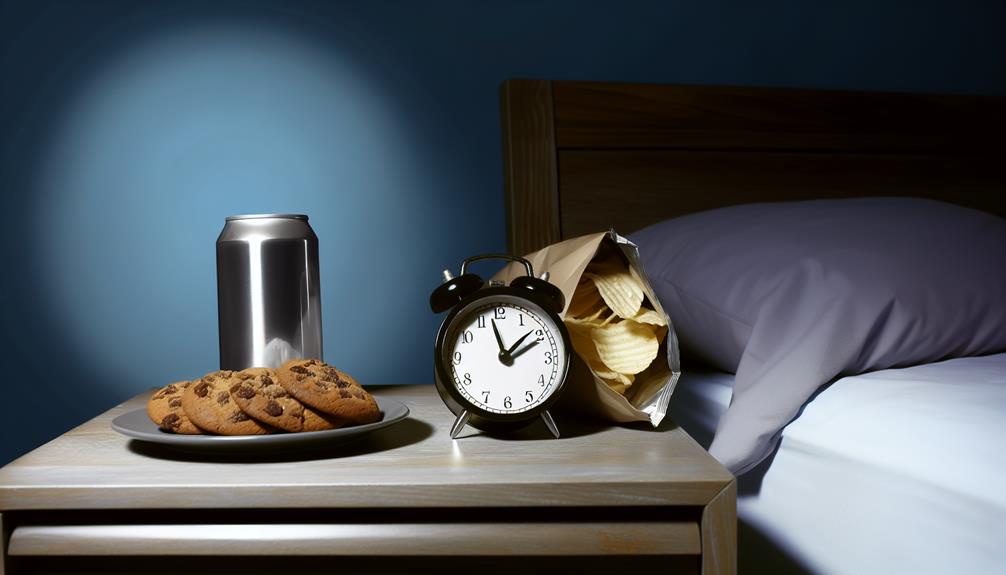Have you ever felt like a car running on fumes after a sleepless night? Just as a car needs the right fuel to run smoothly, your body requires proper nutrition for a restful night's sleep. Research has shown that making simple adjustments to your diet can significantly impact your sleep quality, and Lean Bliss offers practical nutritional tips to help you achieve just that. From the impact of hydration on sleep to the role of specific foods in promoting better rest, there's a lot to explore in the connection between nutrition and sleep. So, if you're ready to unlock the secrets of a truly rejuvenating night's sleep, let's dive into the world of Lean Bliss.
Understanding Lean Bliss
When considering Lean Bliss as a nutritional supplement, understanding its ingredients and their potential impact on weight reduction and blood sugar levels is essential. Lean Bliss contains natural ingredients such as cinnamon extract, corosolic acid, saffron bulb, fucoxanthin, and citrus sinensis. These ingredients play a crucial role in supporting healthy blood sugar levels and weight loss. Cinnamon extract, for example, has been linked to improved insulin sensitivity and lower blood sugar levels. Corosolic acid, derived from the banaba leaf, also shows promise in supporting blood sugar control. Saffron bulb extract has been associated with appetite suppression and may contribute to weight reduction. Furthermore, fucoxanthin, a compound found in brown seaweed, has been studied for its potential to enhance metabolism and promote weight loss. Citrus sinensis, commonly known as sweet orange, contains flavonoids that may aid in supporting overall health and well-being.
Understanding these natural ingredients in Lean Bliss is vital for comprehending how they may contribute to your overall health and well-being. The supplement's focus on promoting healthy blood sugar levels and weight reduction can have a positive impact on your sleep quality. Balanced blood sugar levels and weight management are essential for maintaining a healthy lifestyle, which can, in turn, positively affect your sleep patterns. By incorporating natural ingredients targeted at blood sugar control and weight reduction, Lean Bliss aims to support not only physical health but also overall well-being, potentially leading to improved sleep quality.
The Science of Sleep
Understanding the science of sleep is essential for comprehending how it impacts your overall health and well-being. Sleep plays a crucial role in maintaining physical and mental functions, and its importance cannot be overstated. Here are some key points to consider:
- The body's circadian rhythm, influenced by light and darkness, regulates the sleep-wake cycle and other physiological processes. This internal clock determines when you feel sleepy and when you feel alert, and disruptions to this rhythm can have significant effects on your overall health.
- Hormones such as melatonin and cortisol play key roles in regulating sleep patterns. Melatonin, often referred to as the sleep hormone, helps signal to your body when it's time to sleep, while cortisol, known as the stress hormone, can impact your ability to fall asleep and stay asleep.
- Sleep is essential for memory consolidation, learning, and cellular repair. During sleep, the body undergoes crucial processes for recovery and rejuvenation, impacting your physical and mental well-being.
- Lack of sleep can lead to impaired cognitive function, reduced immune function, and increased risk of chronic illnesses. Prioritizing good sleep is a natural and effective way to promote weight loss and maintain a healthy weight.
For more in-depth information, you can visit the official website of reputable sleep and health organizations to learn about the science of sleep and its impact on your well-being.
Balanced Diet and Sleep

Balanced nutrition plays a vital role in supporting your body's circadian rhythm and promoting restful sleep, influencing your overall health and well-being. To optimize your sleep quality, it's essential to include a variety of colorful fruits and vegetables, lean proteins, whole grains, and healthy fats in your diet. These foods provide a range of essential nutrients that support overall health, including sleep. Incorporating foods rich in magnesium, such as nuts, seeds, and leafy greens, can promote relaxation and improve sleep quality.
Additionally, it's important to pay attention to the timing and composition of your meals. Avoid heavy or spicy meals close to bedtime, as they can cause discomfort and disrupt your ability to fall asleep. Limiting caffeine and alcohol intake is also crucial, as they can interfere with your sleep cycle. Aim for a balanced intake of carbohydrates, proteins, and fats throughout the day to stabilize blood sugar levels and support restful sleep.
Staying hydrated is equally important for good sleep. Make sure to drink plenty of water and consider including sleep-supporting foods like tart cherries or kiwi in your evening snack. These foods contain compounds that can help regulate your sleep-wake cycle. By following these nutritional tips and maintaining a balanced diet, you can significantly improve your sleep quality and overall well-being.
Impact of Hydration on Sleep
Ensuring proper hydration is essential for supporting optimal sleep quality and overall well-being. Here's why staying hydrated is crucial for a good night's sleep:
- Regulating Body Temperature: Adequate hydration helps regulate your body temperature, promoting relaxation and making it easier to fall asleep.
- Preventing Nighttime Disruptions: Dehydration can lead to disrupted sleep patterns and increase the chances of waking up during the night, impacting your overall sleep quality.
- Alleviating Nocturnal Leg Cramps: Consuming sufficient water throughout the day can help prevent nocturnal leg cramps, allowing for a more restful sleep.
- Supporting Natural Detoxification: Proper hydration supports the body's natural detoxification process, helping you achieve a more restorative and restful sleep.
Incorporating these hydration practices can have a positive impact on your sleep, energy levels, managing blood sugar levels, and overall wellness. Remember that water is a natural supplement for improving sleep quality, and staying adequately hydrated throughout the day can contribute to better sleep at night.
Nutrient-Rich Foods for Better Sleep

When it comes to improving your sleep through nutrition, it's important to consider sleep-friendly food choices. Certain nutrients play a crucial role in promoting better sleep, and the timing of your meals can also impact your sleep quality. By focusing on nutrient-rich foods and paying attention to when you eat, you can support your body's natural sleep-wake cycles and improve your overall sleep experience.
Sleep-Friendly Food Choices
To improve your sleep quality, consider incorporating nutrient-rich foods such as leafy greens, nuts, seeds, and fish into your diet. These foods can support better sleep by providing essential nutrients for overall wellness and maintaining steady blood sugar levels. Additionally, including foods high in magnesium, such as spinach, almonds, and avocados, can promote relaxation and improve sleep quality. Complex carbohydrates like whole grains and legumes help regulate serotonin levels, aiding in sleep. Foods rich in tryptophan, such as turkey, eggs, and tofu, support the production of sleep-inducing hormones. It's also important to avoid heavy, greasy, or spicy foods close to bedtime to prevent discomfort and disrupted sleep. Consider incorporating Ceylon Cinnamon, a spice known for its potential sleep-promoting effects, into your diet.
Importance of Nutrients
Incorporating a variety of nutrient-rich foods into your diet is essential for promoting better sleep quality and duration, building upon the sleep-friendly food choices previously discussed. Nutrient-rich foods play a crucial role in improving sleep patterns. Foods high in magnesium, such as leafy greens, nuts, and seeds, aid in relaxation and can improve sleep. Similarly, foods rich in tryptophan, like turkey, bananas, and dairy products, enhance the production of sleep-inducing hormones. Additionally, incorporating vitamin B6-rich foods, including chickpeas, tuna, and salmon, can help in the production of melatonin, a hormone essential for regulating sleep. Consuming a variety of nutrient-dense foods, such as fruits, vegetables, and whole grains, supports overall health and contributes to improved sleep patterns. By including these nutrient-rich foods in your diet, you can enhance your sleep and overall well-being.
Meal Timing Impact
Nutrient-rich foods, consumed at optimal times, can have a significant impact on improving both the quality and duration of your sleep. To optimize your meal timing for improved sleep, consider the following tips:
- Aim for a balanced meal with lean proteins, complex carbs, and healthy fats a few hours before bedtime to support restful sleep.
- Include foods rich in tryptophan, magnesium, and melatonin, such as turkey, nuts, seeds, and tart cherries, to aid in improving sleep quality.
- Avoid heavy, spicy, or large meals close to bedtime to prevent discomfort and disruptions in sleep.
- Consistently time your meals and snacks throughout the day to help regulate your body's internal clock and optimize sleep-wake cycles.
Foods to Avoid Before Bed

You should avoid consuming caffeine before bed, as it can disrupt your sleep patterns and keep you awake. Additionally, steer clear of spicy and acidic foods, as they can cause heartburn and discomfort during the night. It's also best to skip high-fat, greasy, and large meals before bedtime to prevent discomfort and disrupted sleep.
Late-Night Caffeine
To promote better sleep, it's advisable to steer clear of consuming caffeine-containing foods like chocolate, coffee, and energy drinks before bedtime. Late-night caffeine consumption may disrupt sleep patterns and lead to difficulty falling asleep. Caffeine has a stimulating effect and can interfere with the body's natural sleep-wake cycle if consumed too close to bedtime. Consuming caffeine-containing foods before bed may result in restless sleep and reduced overall sleep duration. Opt for caffeine-free herbal teas or other non-caffeinated snacks if hunger strikes before bedtime to support better sleep.
- Avoid coffee, chocolate, and energy drinks in the evening.
- Choose decaffeinated herbal teas or non-caffeinated snacks if hungry before bed.
- Limit caffeine consumption to enhance sleep quality.
- Be mindful of hidden sources of caffeine in certain foods and medications.
High-Sugar Snacks
After considering the impact of late-night caffeine on sleep, it's important to also be mindful of the potential effects of high-sugar snacks before bed. High-sugar snacks can disrupt sleep by causing blood sugar spikes and providing energy boosts, leading to increased alertness and difficulty falling asleep. These snacks may also cause frequent awakenings during the night, as they can trigger fluctuations in blood sugar levels, disrupting sleep patterns. Avoiding high-sugar snacks before bed is essential for promoting better sleep quality and overall restfulness. Instead, consider healthier alternatives such as snacks containing Saffron Bulb Extract or Cinnamon Bark, which can help stabilize blood sugar levels and support healthy blood sugar regulation, potentially contributing to improved sleep. Making mindful choices about bedtime snacks can significantly impact your sleep quality.
The Role of Supplements
Supplements play a crucial role in supporting balanced blood sugar levels and promoting a lean and fit body, making them a valuable addition to a healthy lifestyle. When it comes to achieving lean bliss and improving sleep, supplements can be an essential part of your daily routine. Here are some key points to consider when incorporating supplements into your nutritional plan:
- Lean Bliss supplements are formulated with organic components derived from plant-based sources, making them safe for vegetarians and vegans. This ensures that you can support your nutritional goals without compromising your dietary preferences.
- The supplements are effective for reducing excess weight and fats, and they assist in managing stable blood sugar levels. By incorporating these supplements into your routine, you can work towards achieving a healthier body composition and supporting overall well-being.
- Lean Bliss supplements are crafted from natural ingredients, non-GMO, and do not contain stimulants or artificial components, ensuring safety and efficacy. This means that you can prioritize your health and wellness without exposure to potentially harmful additives.
- It's important to consult with a healthcare professional before taking supplements, especially if undergoing treatment or chemotherapy, to ensure safety and avoid potential side effects. Prioritizing personalized guidance can help you make informed decisions about which supplements are best suited to your individual needs.
Incorporating supplements into your daily routine can be a valuable component of your overall approach to achieving lean bliss and improving sleep. Always prioritize safety and consult with a healthcare professional to determine the best approach for your unique circumstances.
Meal Timing and Sleep Quality

When it comes to optimizing your sleep quality, meal timing can play a crucial role in regulating your body's internal clock and promoting restful nights. Consuming meals at consistent times each day can help synchronize your body's natural rhythms, leading to improved sleep. Avoiding large, heavy meals close to bedtime is essential to prevent discomfort and indigestion that may disrupt your sleep. Instead, focus on a balanced dinner containing protein, healthy fats, and complex carbohydrates. This can promote better sleep by stabilizing blood sugar levels throughout the night. Consider incorporating a sleep-supportive snack before bed, such as a banana or a handful of nuts, as it provides a steady release of nutrients that support restful sleep. Experimenting with meal timing to find a routine that minimizes late-night hunger without causing discomfort can contribute to improved sleep quality.
To further illustrate the impact of meal timing on sleep quality, let's consider the following table:
| Meal Timing Tips | Description |
|---|---|
| Consistency | Eat meals at the same times daily to regulate your body's internal clock. |
| Dinner Balance | Opt for a balanced dinner containing protein, healthy fats, and complex carbohydrates to stabilize blood sugar levels. |
| Sleep-Supportive Snack | Incorporate a small, sleep-supportive snack before bed to provide a steady release of nutrients that support restful sleep. |
| Late-Night Hunger | Experiment with meal timing to minimize late-night hunger without causing discomfort. |
Creating a Sleep-Friendly Environment
To create an optimal sleep environment, ensure that your bedroom is cool, dark, and quiet. Consider the following tips to make your bedroom a haven for restful sleep:
- Temperature: Keep the room between 60-67°F (15-19°C) as this range is often found to be the most conducive for sleep. A cooler environment can help signal your body that it's time for sleep.
- Light: Invest in blackout curtains or an eye mask to block out any light that may seep into your room. This can help regulate your circadian rhythm and improve the quality of your sleep.
- Sound: Use earplugs or a white noise machine to mask disruptive noises. Creating a quiet environment can help you fall asleep faster and stay asleep throughout the night.
- Comfort: Invest in a comfortable mattress and pillows that provide the right support for your body. This can significantly impact the quality of your sleep and overall sleep satisfaction.
Frequently Asked Questions
Can Stress and Anxiety Affect Sleep Quality, and if So, What Are Some Ways to Manage These Issues for Better Sleep?
Stress and anxiety can definitely mess with your sleep quality. It's tough, but managing these issues can make a big difference. Try relaxation techniques like mindfulness and deep breathing exercises. These help calm your mind and body, making it easier to drift off. Also, setting aside time for stress management activities can have a positive impact on your sleep. Give it a shot and see if it helps you get some better Zzzs.
How Does Exercise and Physical Activity Impact Sleep, and What Types of Activities Are Most Beneficial for Improving Sleep Quality?
Regular exercise positively impacts sleep duration and quality. Engaging in physical activity, such as aerobic exercises or strength training, can help improve sleep patterns. Studies show that individuals who are physically active tend to experience better sleep. It's recommended to aim for at least 150 minutes of moderate-intensity exercise per week for optimal sleep benefits. However, it's important to avoid vigorous activity close to bedtime as it may negatively impact sleep.
Are There Specific Sleep Disorders That Can Be Improved Through Nutritional Changes, and What Are Some Dietary Recommendations for Managing These Conditions?
When it comes to sleep disorders, nutritional interventions can make a difference. Certain conditions like insomnia or restless legs syndrome may be managed through dietary adjustments. For improving sleep quality, consider incorporating foods rich in tryptophan, magnesium, and melatonin, such as turkey, nuts, and tart cherries. Additionally, reducing caffeine and sugar intake, and maintaining a balanced diet can positively impact sleep. These dietary recommendations can play a crucial role in managing sleep disorders and enhancing overall sleep quality.
What Role Do Caffeine and Alcohol Play in Disrupting Sleep, and What Are Some Strategies for Reducing Their Negative Impact on Sleep Quality?
If you're struggling with sleep, caffeine consumption and alcohol effects can disrupt your sleep patterns. To improve sleep quality, focus on sleep hygiene and make dietary adjustments. Cut back on caffeine, especially in the afternoon and evening, as it can linger in your system and interfere with sleep. Similarly, limit alcohol intake, which can disrupt sleep cycles. By prioritizing sleep hygiene and making these dietary changes, you can work toward better sleep.
How Does Technology and Screen Time Before Bed Affect Sleep, and What Are Some Tips for Creating a Digital-Free Bedtime Routine for Better Sleep?
Struggling to drift off at night? Blue light from screens messes with your sleep hormones, reducing melatonin production and disrupting your sleep quality. Time for a digital detox in your bedtime routine. Set a screen curfew, switch to dimmer light, and wind down with a book or calming music. Your body needs this break from technology to help you ease into a restful sleep.
